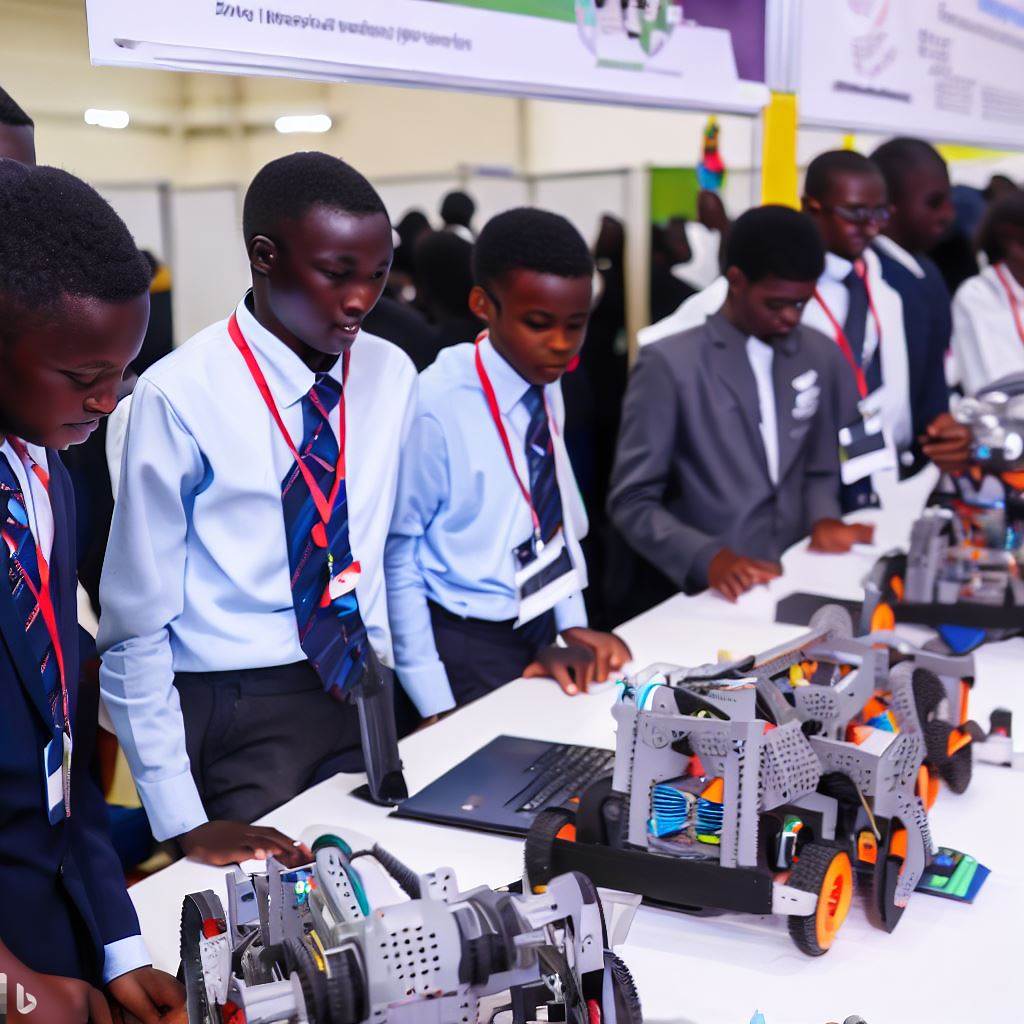Introduction
In this blog section, we will explore the emerging trends in robotics engineering in Nigeria. Robotics engineering is the field that deals with designing, building, and programming robots.
Robotics engineering is crucial in today’s world as it enables automation, enhances efficiency, and solves complex problems.
It has applications in various industries including manufacturing, healthcare, agriculture, and transportation.
In Nigeria, the field of robotics engineering is experiencing rapid growth and development. There is an increasing interest in robotics education, research and innovation.
This has led to the emergence of several trends that are shaping the future of robotics engineering in Nigeria.
Education and Training in Robotics Engineering in Nigeria
Current status of robotics engineering education in Nigeria
- The current status of robotics engineering education in Nigeria is still in its early stages.
- There are only a few universities and institutions offering programs and courses in robotics engineering.
- The demand for robotics engineers in Nigeria is increasing, but the supply of qualified professionals is limited.
- Many students in Nigeria are not aware of the opportunities and potential of robotics engineering.
Challenges faced in providing adequate training in robotics engineering
- The lack of adequate funding and resources is a significant challenge in providing training in robotics engineering.
- The shortage of qualified faculty members who specialize in robotics engineering is a limiting factor.
- The need for specialized laboratories and equipment is necessary for hands-on training but is lacking.
- The curriculum and course materials need to be updated regularly to keep up with the evolving field of robotics.
Efforts made by universities and institutions to improve education in this field
- Some universities in Nigeria have started offering undergraduate and postgraduate programs in robotics engineering.
- These universities are collaborating with industry partners to provide internships and practical training to students.
- Universities are organizing workshops, conferences, and seminars to raise awareness about robotics engineering.
- Efforts are being made to secure funding from the government and private sector to enhance infrastructure and resources.
Efforts to expand and enhance robotic engineering education in Nigeria are underway, overcoming challenges through collaboration.
Few institutions offer programs; more are needed to meet demand and improve opportunities.
Limited funding hampers hands-on training labs and equipment; qualified faculty scarcity is another hurdle.
Initiatives include new programs, industry partnerships for practical experience, workshops, and seminars.
Funding from government and private sector supports infrastructure and technology upgrades for cutting-edge labs.
Nigeria is striving to develop a skilled workforce in robotics engineering to meet growing demand.
Read: Challenges Faced by Automation Engineers in Nigeria
Integration of Artificial Intelligence in Robotics Engineering
Artificial Intelligence (AI) has become an integral part of robotics engineering, revolutionizing the field in Nigeria.
This section delves into the emerging trends, applications, benefits, and challenges associated with integrating AI in robotics engineering in the country.
Exploring the increasing use of AI in robotics engineering
The integration of AI in robotics has witnessed significant growth in Nigeria due to advancements in technology and the need for automation.
AI serves as a catalyst in enhancing the capabilities of robots, enabling them to perform complex tasks and adapt to changing environments.
As robotics engineering expands in Nigeria, AI is being employed in various applications to improve the functionality and efficiency of robots.
Applications of AI in robotics
- Object recognition: AI algorithms enable robots to identify and categorize objects in their surroundings accurately. This capability is crucial for autonomous robots required to interact with their environment.
- Machine learning: AI-powered robots can learn from their experiences and optimize their performance over time. Through machine learning, robots become smarter and more efficient in their operations.
- Natural language processing: AI enables robots to comprehend human speech and respond accordingly. This feature facilitates human-robot interaction, making robots more user-friendly and easier to control.
- Autonomous navigation: AI algorithms help robots navigate and avoid obstacles autonomously. This capability is especially useful in industrial settings, where robots need to move independently without human intervention.
Potential benefits of integrating AI into robotics engineering in Nigeria
- Enhanced productivity: AI-powered robots can accomplish tasks faster, more accurately, and tirelessly, leading to increased productivity in various industries.
- Improved safety: Robots integrated with AI can perform hazardous tasks that endanger human lives. By replacing humans in risky environments, AI-powered robots minimize the potential for accidents and injuries.
- Precision and accuracy: AI algorithms enable robots to perform complex tasks with high precision and accuracy. This attribute is especially valuable in applications such as manufacturing, where precision is crucial.
- Increased automation: The integration of AI reduces the need for human intervention, leading to increased automation in industries. This automation streamlines processes, reduces costs, and improves overall efficiency.
Challenges of integrating AI into robotics engineering in Nigeria
- Lack of skilled workforce: Nigeria faces a shortage of professionals skilled in both AI and robotics engineering. Developing a competent workforce is essential to fully harness the potential of integrating AI into robotics.
- High costs: Advanced AI technologies are often expensive, making it challenging for many organizations in Nigeria to adopt them. The high costs associated with acquiring and maintaining AI-powered robots pose financial constraints.
- Ethical considerations: Integrating AI into robotics raises ethical concerns regarding the impact on employment and societal harmony. Finding a balance between technological progress and human well-being requires careful consideration.
- Security risks: AI-powered robots are vulnerable to cyber-attacks and hacking attempts, posing potential risks to data confidentiality, privacy, and even physical safety. Implementing robust security measures is crucial to mitigate these risks.
In summary, the integration of AI in robotics engineering in Nigeria presents immense opportunities for innovation and growth.
The applications of AI in object recognition, machine learning, and natural language processing enhance robot capabilities, while benefits like increased productivity and improved safety are significant.
However, challenges such as the shortage of skilled workforce and high costs need to be addressed to maximize the potential of AI in robotics engineering in Nigeria.
Read: How to Become a Robotics Engineer in Nigeria
Robotics Solutions in Industrial Automation
Industrial automation refers to the use of advanced technologies, such as robotics, to automate tasks and processes in manufacturing industries.
In Nigeria, there is an increasing trend of adopting robotics solutions in industrial automation to enhance productivity, efficiency, and job creation.
Overview of the use of robotics in industrial automation
Robotics plays a crucial role in industrial automation by performing a wide range of tasks that were previously done by humans.
These tasks include assembly, welding, material handling, and quality control. With advancements in robotics technology, robots are becoming more intelligent, flexible, and efficient.
In Nigerian industries, robotics solutions are being applied to streamline production processes, reduce errors, and improve overall efficiency.
These solutions typically involve the integration of robotic arms, sensors, and AI-powered systems to perform complex tasks with precision and accuracy.
Case studies of successful implementation of robotics solutions in Nigerian industries
- Company XYZ: A leading automobile manufacturing company in Nigeria implemented robotics solutions in their assembly line. By incorporating robots for tasks such as welding and painting, they witnessed a significant increase in production output and reduced defects.
- Company ABC: A food processing company integrated robotic arms into their packaging process. This automation solution not only improved packaging speed but also ensured consistent quality, resulting in customer satisfaction and increased sales.
- Company DEF: A pharmaceutical company adopted robotics solutions for drug dispensing and packaging. This automation not only reduced the risk of errors but also improved efficiency, allowing the company to meet the increasing market demand.
These case studies demonstrate that robotics solutions have proven to be successful in enhancing productivity, efficiency, and quality in Nigerian industries.
Potential impact of robotics on productivity, efficiency, and job creation
The integration of robotics solutions in industrial automation has the potential to significantly impact productivity and efficiency in Nigerian industries.
Robots can work continuously without breaks, leading to higher production output and reduced turnaround time.
By automating repetitive and mundane tasks, robots free up human workers to focus on more complex and creative tasks.
This enhances overall efficiency and allows companies to utilize human resources more effectively.
Furthermore, the adoption of robotics solutions can create new job opportunities in Nigeria.
Although there is a concern that automation may replace human jobs, it can also lead to the creation of new roles such as robot operators, maintenance technicians, and programmers.
As robotics technology evolves, the demand for skilled workers in these areas is expected to increase.
In general, robotics solutions in industrial automation have the potential to revolutionize Nigerian industries.
The successful implementation of robotics in various sectors highlights its positive impact on productivity, efficiency, and job creation.
It is crucial for Nigerian businesses to embrace these emerging trends in robotics engineering to stay competitive in the global market.
Read: Introduction to Automation & Robotics Engineering in Nigeria
Emerging Applications of Robotics Engineering in Healthcare
Robotics engineering is revolutionizing various industries, and one sector where its impact is particularly noteworthy is healthcare.
The advancements in robotic-assisted surgery, patient care, rehabilitation robotics, and the potential it holds for Nigeria’s healthcare system are worth discussing.
In this blog section, we will delve into the emerging applications of robotics engineering in healthcare and explore the benefits and challenges of integrating robotics in healthcare services.
Advancements in Robotic-Assisted Surgery
Robotic-assisted surgery has gained significant popularity in recent years, and for good reason.
With the help of robotic systems, surgeons can perform complex procedures with more precision and control.
These robots provide surgeons with enhanced visualization, 3D imagery, and magnification, making it easier to operate on delicate tissues.
The da Vinci Surgical System, a widely renowned robotic surgical system, is a prime example of the advancements in robotic-assisted surgery.
It enables surgeons to perform minimally invasive procedures with improved outcomes, reduced blood loss, smaller incisions, and shorter hospital stays for patients.
Patient Care
In addition to surgical applications, robotics engineering contributes to improving patient care in various ways.
Robots are being used to assist healthcare professionals in tasks such as patient monitoring, medication administration, and rehabilitation.
For instance, robotic nurses can provide continuous monitoring of patients vital signs, ensuring timely intervention in case of abnormalities.
Telepresence robots enable doctors to remotely interact with patients, reducing the need for physical presence and allowing for virtual consultations, particularly in rural areas with limited access to healthcare services.
Overview of Rehabilitation Robotics and its Potential in Nigeria’s Healthcare System
Rehabilitation robotics is an emerging field that focuses on using robotic devices to aid in the recovery and rehabilitation of patients with disabilities or impairments.
These devices can improve mobility, enhance muscle strength, and assist in motor skill relearning.
In Nigeria’s healthcare system, rehabilitation robotics can play a significant role in providing better care to patients with physical disabilities.
Many patients suffer from conditions such as strokes or spinal cord injuries, and robotic devices can help them regain independence and improve their quality of life.
The introduction of such technologies will bring hope to countless individuals who are currently limited in their mobility.
Benefits and Challenges of Integrating Robotics in Healthcare Services
Integrating robotics in healthcare services offers numerous benefits, but it also comes with challenges that need to be addressed.
The benefits include improved precision, reduced human error, better outcomes, and enhanced patient experiences.
However, challenges such as high initial costs, training requirements for healthcare professionals, and ethical considerations regarding robot autonomy and decision-making need to be carefully navigated.
Additionally, the acceptance and trust of patients and healthcare providers in robotic systems must be fostered through education and awareness.
Generally, the emerging applications of robotics engineering in healthcare signify a new era of advanced medical technologies.
Robotic-assisted surgery, patient care, rehabilitation robotics, and their potential in Nigeria’s healthcare system present immense opportunities for improved treatment outcomes and better patient experiences.
While there are challenges to overcome, the benefits and potential impact cannot be ignored.
With continued research and development, robotics engineering will continue to reshape and enhance healthcare services in Nigeria and around the world.
Read: Agricultural Engineers: The Unsung Heroes of Nigeria

Robotics Engineering in Agriculture and Food Processing
Exploring the potential application of robotics in agriculture can revolutionize Nigeria’s agricultural sector.
With advancements in robotics engineering, the use of robots in agriculture and food processing has become increasingly feasible.
Benefits of using robots in agriculture
- Increased efficiency: Robots can perform repetitive tasks with precision and speed, enhancing productivity in farming and food processing.
- Reduced labor: With a shortage of agricultural laborers, robots can fill this gap and reduce manual labor requirements.
- Improved safety: Robots can handle hazardous tasks, eliminating the risk of injury to human workers.
- Enhanced accuracy: Robots can precisely apply fertilizers, pesticides, and other agrochemicals, ensuring optimal usage.
- 24/7 operation: Robots can work tirelessly without the need for breaks or rest, maximizing productivity.
Robots can be deployed in various agricultural activities, such as planting, watering, weeding, harvesting, and packing.
These robots can be equipped with sensors and artificial intelligence algorithms to perform these tasks efficiently.
Overview of current initiatives and challenges in adopting robotics in Nigeria’s agricultural sector
Nigeria is gradually embracing the use of robotics in agriculture, although several challenges hinder widespread adoption.
Initiatives
- The National Centre for Robotics and Artificial Intelligence (NCRAI) is promoting research and development in robotics engineering for agriculture.
- The establishment of robotics training centers and universities offering robotics engineering courses fosters expertise in this field.
- Partnerships between technology companies and agricultural organizations facilitate knowledge transfer and technological advancements.
Challenges
- Cost: Acquiring and maintaining robotic systems can be expensive, limiting access for small-scale farmers.
- Lack of awareness: Many farmers are unaware of the potential benefits and applications of robotics in agriculture.
- Infrastructure limitations: Inadequate power supply and poor connectivity hamper the operational efficiency of robotic systems.
- Limited technical expertise: There is a shortage of skilled professionals proficient in robotics engineering.
- Policies and regulations: Clear guidelines and regulations are required to ensure safe and ethical use of robots in agriculture.
To address these challenges, the government, educational institutions, and industry stakeholders must collaborate to promote robotics in agriculture.
Offering financial support, organizing awareness campaigns, and investing in infrastructure can accelerate the adoption of robotics in Nigeria’s agricultural sector.
By leveraging robotics engineering in agriculture, Nigeria can increase food production, improve efficiency, and create a sustainable farming ecosystem.
You Might Also Like: Role of Petroleum Engineers in Nigeria’s Energy Sector
Future Prospects and Challenges for Robotics Engineering in Nigeria
In recent years, robotics engineering has gained significant attention and recognition in Nigeria.
With advancements in technology and the increasing demand for automation, there is immense potential for growth and innovation in this field. However, several challenges hindering progress need to be addressed.
Potential for Growth and Innovation
- Nigeria has a large population, which presents a vast market for robotics solutions and applications.
- The need for automation in various sectors such as healthcare, agriculture, and manufacturing is increasing.
- Emerging industries like artificial intelligence and Internet of Things (IoT) provide opportunities for robotics integration.
- Nigerian universities are making efforts to establish robotics research centers and offer specialized courses.
- Government initiatives and policies supporting technology and innovation can foster the growth of robotics engineering.
Challenges Faced by Robotics Engineers in Nigeria
- Funding is a major challenge as robotics research and development projects require significant financial resources.
- Limited access to advanced equipment, tools, and components affects the progress of robotics engineering.
- Shortage of skilled robotics engineers and experts hampers the effective implementation of projects.
- Infrastructure inadequacies, including unreliable power supply and lack of high-speed internet, pose significant challenges.
- The absence of a clear regulatory framework for robotics limits the growth and adoption of this technology.
Overcoming Challenges and Promoting Development
- The government should allocate more funding towards research and development in robotics engineering.
- Public-private partnerships can be formed to create specialized robotics laboratories and training centers.
- Collaboration with international institutions can facilitate knowledge sharing and access to advanced resources.
- Investing in education and training programs will help produce a skilled workforce in robotics engineering.
- Improving infrastructure, particularly reliable power supply and internet connectivity, is crucial for success.
- Establishing a regulatory framework will provide guidelines for the ethical and safe use of robotics technology.
- Encouraging entrepreneurship and innovation through incentives can drive the development of robotics start-ups.
Essentially, robotics engineering in Nigeria shows immense potential for growth and innovation.
However, challenges such as funding, infrastructure, and skill shortages need to be addressed to fully harness the benefits of this technology.
By investing in resources, education, and collaborations while implementing a supportive regulatory framework, Nigeria can overcome these challenges and promote the development of robotics engineering, leading to technological advancements and economic growth.
Conclusion
Robotics engineering in Nigeria has seen several emerging trends that are shaping the future of technology in the country.
These trends include the use of robotics in manufacturing, healthcare, agriculture, and education sectors.
Embracing robotics in Nigeria is of great significance as it can lead to technological advancement and economic growth.
With the increasing demand for automation and efficient processes, robotics engineering can greatly enhance productivity and create job opportunities.
Therefore, it is crucial for Nigeria to actively invest in and collaborate with stakeholders in the robotics industry.
This can be achieved through partnerships with universities, research institutions, and international organizations to foster knowledge sharing and skill development.
By embracing robotics engineering, Nigeria can drive innovation, boost industrialization, and address societal challenges.
It is essential for the government, private sector, and academia to work together in developing policies, funding research, and providing training programs to nurture a vibrant robotics ecosystem.
Finally, Nigeria has a great potential to become a leader in robotics engineering in Africa.
The country should seize this opportunity by embracing and investing in this field, which can lead to overall technological advancement and economic prosperity.




